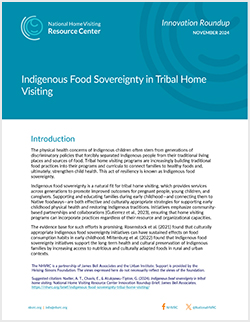
 Generations of harmful policies have forcibly removed Indigenous people from their traditional living places and sources of foods, impacting the health of adults and children. To counter these events, some communities engage in an act of resilience known as food sovereignty, in which they seek to control the production and distribution of food to determine its quantity and quality. The initial evidence base for food sovereignty initiatives is promising. Rosenstock et al. (2021)* found that culturally appropriate food sovereignty initiatives can have sustained effects on food consumption habits in early childhood. Miltenburg et al. (2022)* found that food sovereignty initiatives support the long-term health and cultural preservation of Indigenous families by increasing access to nutritious and culturally adapted foods in rural and urban contexts.
Generations of harmful policies have forcibly removed Indigenous people from their traditional living places and sources of foods, impacting the health of adults and children. To counter these events, some communities engage in an act of resilience known as food sovereignty, in which they seek to control the production and distribution of food to determine its quantity and quality. The initial evidence base for food sovereignty initiatives is promising. Rosenstock et al. (2021)* found that culturally appropriate food sovereignty initiatives can have sustained effects on food consumption habits in early childhood. Miltenburg et al. (2022)* found that food sovereignty initiatives support the long-term health and cultural preservation of Indigenous families by increasing access to nutritious and culturally adapted foods in rural and urban contexts.
Indigenous food sovereignty aligns with tribal home visiting’s goal to support the health and well-being of young children and their caregivers. Home visitors work with families regularly, providing ongoing opportunities to connect them to traditional foodways and revitalize meaningful traditions. Home visiting program staff can also engage with community members and partners to come up with ideas that align with available time and resources.
This brief presents three Indigenous food sovereignty partnerships that include home visiting programs and models:
- Gikinawaabi curriculum
- Native American Professional Parent Resources fresh produce initiative
- Family Spirit Nurture curriculum
It concludes with guidance for others seeking to embark on similar efforts. Suggestions include determining who is already working toward Indigenous food sovereignty in your community and establishing clear boundaries to communicate what will and will not work for your program.
*See the full brief for citations.
Suggested citation: Nadler, A. T., Chavis, E., & Atukpawu-Tipton, G. (2024). Indigenous food sovereignty in tribal home visiting. National Home Visiting Resource Center Innovation Roundup Brief. James Bell Associates. https://nhvrc.org/brief/indigenous-food-sovereignty-tribal-home-visiting/
Acknowledgments: Thank you to Amanda Bahrou, Jessica Barnes Najor, Amanda Harris, Amanda Rinna, Aliandra Maes, and Leonela Nelson for sharing information about their programs. Thank you to Allison Meisch, Joelle Ruben, and Jill Filene for shaping and editing the brief, and to Kristine Neurauter for providing formatting support.